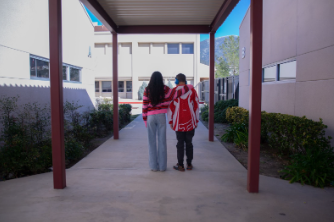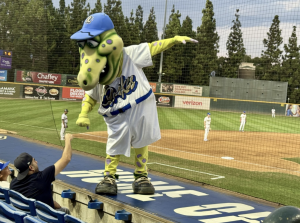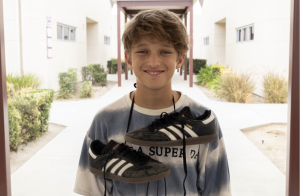My Special Sibling

Ameerah spends time with her autistic brother, Ameer.
March 8, 2023
Ameerah S. is a general education seventh grader at Day Creek Intermediate. She gets to school, goes to class, and talks to her friends during lunch. But her autistic twin brother, Ameer, is in special education. What is “normal” like for Ameerah having a sibling with unique needs?
“[Having a sibling with a disability isn’t] too different. He’s nonverbal, so you can’t really have a conversation with him,” Ameerah said.
Siblings communicate with one another all the time, whether it’s from laughing in the car to arguing over whose turn it is to feed the dog. But Ameerah’s family sometimes struggles to talk with her brother.
“I don’t really get [to communicate with Ameer] much, but [if I] ask him a question, he’ll say ‘yes’ or ‘no,’” Ameerah said.
Their family schedule is also another facet of Ameerah’s life. Her family routine consists of more than each person preparing themself for the day. They also have to care for her brother.
“In the mornings, my mom gets my brother ready for school. She’ll pick out his clothes [and] do his hair. She’ll make him his lunch [too]. She just takes care of him all day,” Ameerah said.
Ameerah’s brother is generally cooperative in getting ready, which simplifies the process.
“No, [he doesn’t have a hard time getting ready]. Even if he’s tired, he’ll still get out of bed,” Ameerah said.
Teachers and classroom aides also play a significant role in motivating Ameer’s learning. It’s important for them to recognize his strengths and weaknesses so they can help him learn at a pace that’s ideal, which can be difficult to identify at times. But with personalized techniques and methods, Ameerah’s brother has successfully mastered basic concepts and grade-level subjects.
“Lately, it’s been a little bit of a problem [because he is being taught] stuff he should have learned in elementary [school]. He’s smart enough to learn what we’re learning, but [his teachers] are still teaching him stuff for little kids,” Ameerah said.
Sometimes teaching special education students brings a challenge, especially when working with so many different children and their varying needs. But educators try their best to accommodate students with plans that work.
According to Rasmussen University, “Part of the challenge of being a special education teacher is managing the wide variety of students and their capabilities. For instance, a child who is nonverbal needs an entirely different approach to education than a student with Attention-Deficit/Hyperactivity Disorder (ADHD). This requires teachers to be flexible in their teaching styles while keeping realistic the expectations they have for students.”
Teachers and families of special education kids must be quick to adapt to accommodate their children’s needs. This is especially true for siblings since they are often around their brother or sister.
“He was diagnosed [with autism] when he was two years old, so I don’t remember [anything else],” Ameerah said.
Some siblings of children with special needs may feel ashamed or resentful of their brothers or sisters because peers or culture may identify them uniquely. But as American writer Alethea Kontis said, “Normal is all relative.” All households and their members are unique, so the usual relationship for one family may be completely different from another.
On NPR.org, Dr. Ranit Mishori, who also has a brother with special needs, spoke about her challenges of dating as a teenager. “I did not want [my boyfriend] to see my brother. I have a younger brother with autism, and…I locked my brother up in a room so nobody could see him. And I’m very embarrassed to say that, and I’m sure I’ll be judged harshly by some of the listeners, but that’s the reality.”
When the Howl shared Mishori’s words with Ameerah, it really bothered her. She believes that no one should be embarrassed by a sibling’s disability.
“I don’t like that. That’s a really horrible thing to do. [It’s] like he’s an animal or something. He’s a human being. You’re not going to lock him in a room. [It’s] like, why are you embarrassed? He’s your brother,” Ameerah said.
However, living with a child who has special needs isn’t easy. And in response, sometimes Ameerah may hold herself to higher expectations.
According to ChildMind.org, “When there is a child with special needs in the family, siblings often get less attention. In addition, more may be expected of them, or they may expect more of themselves. They sometimes feel pressure to be ‘good’ or ‘perfect’ in order to make life easier for their parents.”
“In a slight way, I feel like I have to take a further role in my education [and] my grades, [because] it’s not like my brother is going to be able to become a doctor, so [I feel like] it’s kind of my job,” Ameerah said.
Like other kids with disabilities, Ameerah’s brother may face challenges when the family leaves the home.
“If we were to go out in public, and it was really loud or if he heard a child screaming, it would hurt his ears, because [he is more noise sensitive,] and that would cause us to go home, so it’s kind of hard to go out with him, but I think that’s really the only [difficulty],” Ameerah said.
As she and her brother have grown up, it can be a challenge for them to find time to bond. But Ameerah continues to express care and compassion for him, supporting him and his hobbies whenever she can.
“On Saturdays, he [does horseback] riding, and I’ll be there [too]. [Horseback riding] helps him naturally have good posture. He likes it. It’s fun for him. He laughs a lot. In his way of saying that he wants to go, he [repeats], ‘Horses!’” Ameerah said.
Whether it’s supporting Ameer while he’s horseback riding or watching movies together, Ameerah looks out for her brother by acknowledging his needs and feelings in the moment.
“I’ll just ask [my brother] if he’s bothered by [a] noise or anything, [and] if that’s the case, we’ll leave or go outside for a little bit. I sort of have an instinct [to help him],” Ameerah said.
Ameerah makes sure to support Ameer whenever possible, including on campus at Day Creek. On occasion, she even has to stand up for him.
“One time, there was this boy making fun of him in second grade, and I tried telling him to stop and that [it] wasn’t okay. But it didn’t work so we had the teacher read a book about autism. It didn’t work. He made of him the whole time. That was frustrating for me,” Ameerah said.
Despite everything that they may struggle with, there are bright sides to this family too.
“He’s a really happy kid, so he can lighten up the mood. He laughs a lot, and sometimes he sings. [There are] negatives and positives [about having a disabled sibling], but [there’s] more positive than negative,” Ameerah said.





